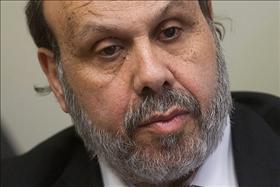A theocratic threat to Israel's rule of law
Minister Azoulay heeds his rabbis rather than his government
It has almost become a painful routine to update our readers on the all too frequent outrageous statements made by Israel's ultra-orthodox cabinet members and MKs, which go against all commonly accepted norms of rule of law and democracy.
06/05/2016 12:20
Tags: David Azoulay · Ministry of Religious Services · democracy · Chief Rabbinate

Minister of Religious Services David Azoulay (Shas Party)
The most recent such pronouncement came on the eve of Passover when Minister of Religious Services David Azoulay (Shas party) proclaimed in a public interview that he would not sign into effect the regulations stipulated in the historic agreement between the government, Women of the Wall, and the non-Orthodox religious movements regarding prayer arrangements at the Western Wall... unless Shas's Council of Torah Sages and the Chief Rabbinate agreed to them.
Our readers will remember previous outrageous pronouncements by Azoulay, such as his declared inability to view Reform Jews as Jews. As significant as his statement is with regard to the unfolding erosion of the yet unimplemented Kotel Agreement, and even more importantly, it provides us with a better understanding of the theocratic threat to Israel's rule of law. Decades ago, the Supreme Court held that rabbinic opinion should not dictate the conduct of government officials in executing their responsibilities according to the law (this ruling was made in 1981 when the Orthodox Minister of Education, responsible for overseeing and licensing archaeological digs, sought the guidance of the Chief Rabbinate regarding the permissibility of conducting digs at the "City of David" site). Thirty-five years later, this fundamental ruling has not been sufficiently internalized - neither by Israel's Orthodox office holders, nor by their non-religious government coalition partners.
No true democratic regime can exist if its executive powers are conditional upon external religious approval.
No true democratic regime can exist if its executive powers are conditional upon external religious approval. With this background in mind we hope you will appreciate the importance of the role played by Hiddush in turning to the Prime Minister and Attorney General regarding Minister Azoulay. Hiddush demanded that Azoulay either be dismissed from the government, being unfit to serve in that official capacity, having repeatedly rejected his allegiance to the rule of law, or - alternatively: that Azoulay be required to publicly retract his pronouncement and declare that he will abide by the government's decisions, the provisions of the law, and the rulings of the civil state courts.